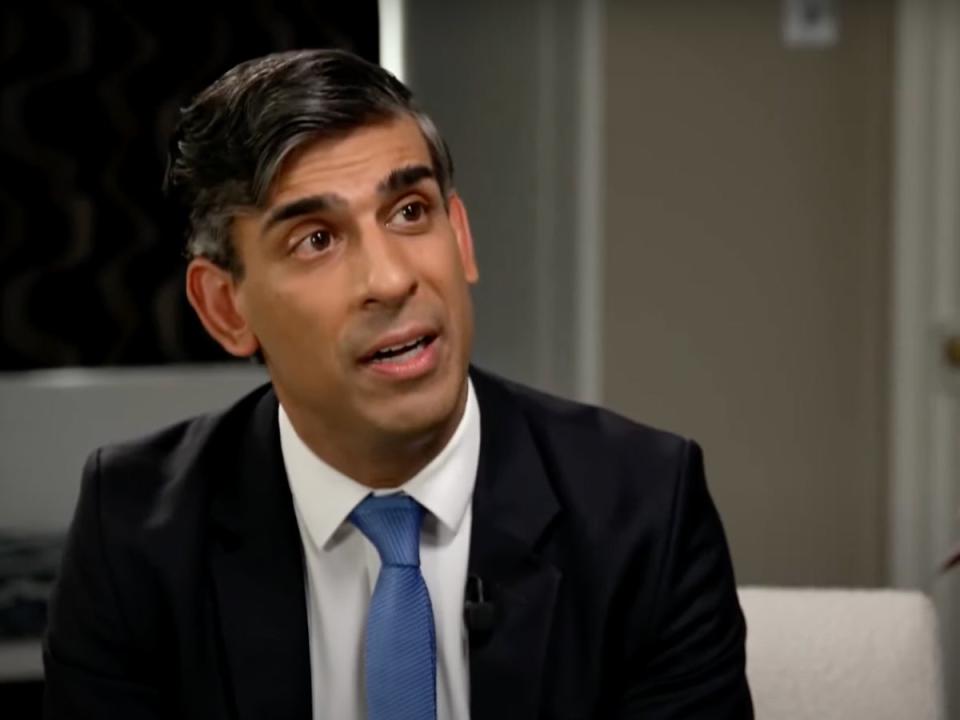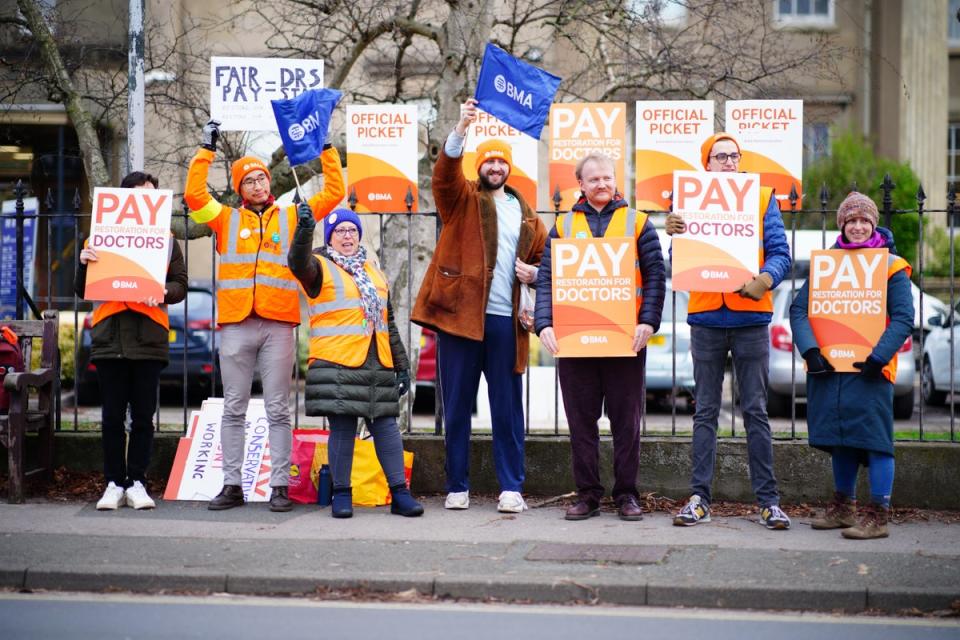Rishi Sunak: I can’t keep pledge to reduce NHS waiting lists
Rishi Sunak admitted to failing on his promise to cut NHS waiting lists – the first time the prime minister has acknowledged he is off track on his five key targets.
The Conservative leader also conceded that his pledge to get the UK economy growing again was still “on the wire” – but insisted that he would finally “stop the boats” once Rwanda deportation flights get up and running.
Mr Sunak was roundly condemned for accepting a “depraved” £1,000 bet with TV interviewer Piers Morgan that he would get the flights to the African country started before the general election.
Elsewhere, fresh doubt was thrown over the Tory party’s promise to expand free childcare, as education secretary Gillian Keegan admitted some local authorities have yet to confirm funding for providers in time for an April deadline.
Ms Keegan said she could not guarantee the pledge to provide working parents of two-year-olds more free hours – insisting that she is leaning on councils in England “very hard” to come up with funding rates soon.
Her admission came as:
Mr Sunak was reported to top officials for a potential breach of the rules over the ‘crude’ Rwanda bet with Morgan
The PM said he is now in a position to cut taxes – and insisted he “sleeps well” believing he does the right things
A grim Organisation for Economic Cooperation and Development (OECD) forecast showed the UK on course to suffer the highest inflation in the G7 this year and next
The education secretary could not give the Tory government the top grade when asked to rate its performance

On Monday, Mr Sunak conceded for the first time that he has not met his pledge to cut the number of NHS patients waiting for treatment – blaming strikes in an interview with Mr Morgan on TalkTV.
Pressed directly on whether he had failed to meet the pledge, he said: “Yes, we have”, adding: “We have not made enough progress.”
Despite recent decreases in the waiting list, it is still higher than when Mr Sunak’s pledge was made over a year ago. The list stood at 7.21 million treatments waiting to be carried out in January 2023. In November, some 7.61 million treatments were waiting to be carried out.
“We all know the reasons for that … industrial action has had an impact,” said Mr Sunak on strikes.
The TalkTV host went on to tell Mr Sunak about his 79-year-old mother’s experience three months ago after having a heart attack – revealing that she waited on a trolley in an A&E corridor for nearly seven hours in a scene she compared to a “war zone”.
The PM said the account was “shocking” and that performance in A&E and with ambulance waiting times were “not good enough”. But he also cited the backlog created by the Covid crisis.
“We can’t escape that,” he added. “When you shut down the country in the NHS for the best part of two years, that has had an impact on everything since then. And we just have to recognise that reality.”

Mr Sunak also admitted that the UK economy may not have grown last year – another of the big five promises set out in January 2023 – despite insisting that progress had been made.
He said: “I think we have made good progress on the economic ones, which are the first three – to halve inflation, grow the economy and reduce debt.”
But the PM acknowledged that it was still “on the wire” whether the British economy had grown or stagnated, before arguing that either outcome was better than the recession some had feared.
“We are on the wire of ‘has it grown a little bit, has it broadly stayed flat?’,” he said, “But fundamentally what was predicted was a year-long recession where the economy shrank by quite a lot ... I am confident that we will be able to keep growing the economy.”
Asked if could take credit for the reduction of inflation to 4 per cent, a battle primarily fought by the independent Bank of England, Mr Sunak replied: “I do, because I don’t think these things happen by accident.”
The OECD lowered its predictions for UK inflation to 2.8 per cent for 2024 and 2.4 per cent for 2025.
But this would still see the UK suffering from a higher level of inflation than any of its G7 colleagues – Canada, Italy, Japan, Germany, France and the US – both this year and next.
Grilled on another of his pledges, to reduce government debt, the Tory leader said: “It is massively on track to happen, and it [debt reduction] has got even better.”
Mr Sunak also said his government was now in a “position to cut taxes” ahead of chancellor Jeremy Hunt’s 6 March announcements. “I never get into this Budget speculation but the direction of travel is clear,” the PM said at further personal tax reductions to come next month.
The Tory leader was heavily criticised for accepting a £1,000 bet with Morgan that the first deportation flights to Rwanda would take place before the general election.
After shaking hands with the TV host on the terms of the Rwanda bet, Mr Sunak said: “I want to get the people on the plane. I am working incredibly hard to get the people on the planes.”
Labour said the “deeply distasteful” bet showed the PM was “totally out of touch with working people”. Green MP Caroline Lucas told The Independent the move was a “new low in our politics”.
The SNP reported Mr Sunak to his own adviser on ministers’ interests and the cabinet secretary over the “depraved” bet – with the party claiming it was a potential breach of ministerial code rule on avoiding conflicts with private interests.
Meanwhile, Ms Keegan defended the government as England’s childcare providers continue to report being unable to commit to offering places for parents of two-year-olds in April, as they remain in the dark about final funding rates.
“The vast majority of [councils] have already [published rates] but there’s a small number that haven’t, and this is causing a bit of friction in the system. I am leaning on them very, very hard,” she told LBC.
The education said she would rate the Sunak government as “good” using Ofsted’s four-point grading scale of outstanding, good, requires improvement, and inadequate.

 Yahoo News
Yahoo News 
